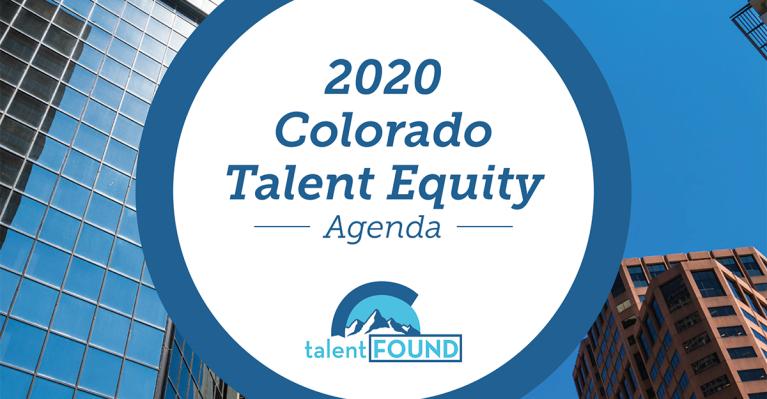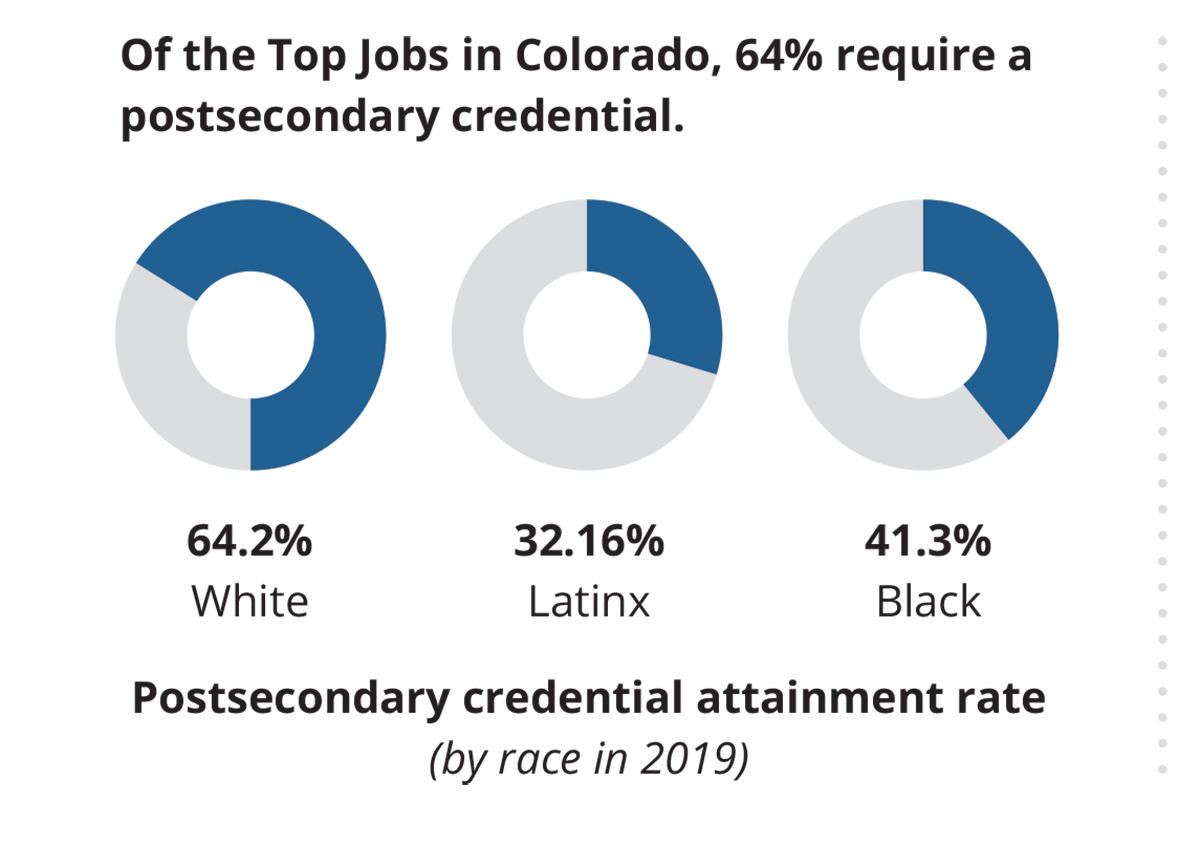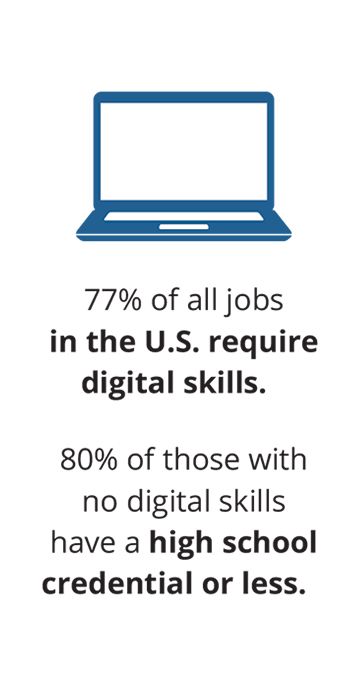
Talent Equity Agenda
Colorado Talent Equity Agenda
The Prosperity Now Scorecard ranks Colorado 12th nationally on overall prosperity of the state’s residents, yet at the same time ranks Colorado 37th when it comes to racial disparities between white residents and residents of color. This gap has significant implications and spotlights a critical need to strengthen how we educate, train, hire, and promote our current workforce.
The Talent Equity Agenda makes the case for targeting resources, raising awareness, and accelerating shared strategies to close racial economic disparities in the state and measure the results.
La Agenda de Equidad de Talentos ahora está disponible en español. Favor de compartir con nuestros socios en educación, negocios y desarrollo económico para mejorar los resultados por medio de la manera en que educamos, capacitamos, contratamos y promovemos a la fuerza laboral de Colorado.
Building Awareness
In March 2021, the CWDC hosted four stakeholder forums with over 300 organizations participating from across Colorado’s talent development network. During the forums, organizations shared how they were moving to action with the strategies outlined in the Talent Equity Agenda. The following strategies rose to the top across stakeholder groups:
- Data Analysis for greater awareness and understanding of racial inequities
- Multiculturally relevant career coaching approaches for career navigation
- Leveraging of My Colorado Journey as a tool for education and career planning
Data to Inform Progress
Throughout the years, racial and ethnic disparities are apparent in unemployment and attainment rates in Colorado. Historically, the white population typically has the lowest unemployment rates while the Hispanic or Black or African American populations have higher rates of unemployment. Explore more data on the Talent Equity Agenda data dashboard.
Testing Strategies from the Talent Equity Agenda
Using the Talent Equity Agenda as a guiding document, the CWDC convened a Community of Practice and Accountability for stakeholders to set in motion plans for addressing racial inequity in their organizations and in the people they serve. The community of practice offered flexible space for stakeholder organizations to reflect on the journey of this work and honor where their organization is on that journey, and provided support for organizations to take the next step. Below is a summary of the organizations' activities and progress made within different Talent Equity Agenda focus areas.
- Career Navigation
Denver Education Attainment Network (DEAN)
Talent Equity Agenda Strategy:
1) Data analysis and access strategies for career pathway programs
2) Recruitment and retention of a greater diversity of candidates for apprenticeship and pre-apprenticeshipGoal:
1) Build a collaborative practice of sharing and reviewing student data together to evaluate student outcomes along academic and career pathways
2) Design a continuum of work-based learning (WBL) experiences to allow all students enrolled in career pathways to apply the content they have learned in the classroom to a real-world work setting while developing essential technical skills and professional readiness needed to be successful in the workplace.Progress: https://denverednetwork.org/data-dashboard/
Public Education and Business Coalition
Talent Equity Agenda Strategy: Diversify Colorado educator workforce
Goal: Establish and follow a process to better understand school district needs and how best meet those needs. Increase participation among people of color in pre-apprenticeships and apprenticeships as an upskilling earn-while-you-learn model.
Progress: https://www.pebc.org/teacher-preparation/
Mi Casa Resource CenterTalent Equity Agenda Strategy: Expand upskilling and accelerated raining for those with entry level jobs
Goal: Expand Stackable credential pathways for office administration
- Closing the Digital Divide
Immigrant and Refugee Center of Northern Colorado
Talent Equity Agenda Strategy: Distribution of wifi enabled computers, tablet and hotspots to engage connection to digital work and learning opportunities
Goal: Address issues of racial equity by increasing access to technology (hot spots, devices including tablets and computers, e.g.) and Provide opportunities for Communities of Color, specifically English Language Learners to learn relevant digital literacy skills (children, youth, and adults)—these latter efforts will be informed by information collected by the Office of the Future of Work
Progress: https://www.ircnoco.org/digitalliteracy
- Postsecondary Credential Attainment
Denver Education Attainment Network (DEAN)
Talent Equity Agenda Strategy: SB 297 - Revising Higher Education Performance. Requirements: This policy prompts higher education institutions to set goals for overall retention and credential attainment for Black, Hispanic, Native American/Alaska and Pell students. The Colorado Department of Higher Education (CDHE) aggregates this information into the Master Plan Dashboard.
Goal: Increase high-quality credential attainment among Black, Latinx, low-income and first generation Denver students by creating and connecting clear academic and career pathways across partner institutions, aligning navigation and co-curricular support and advising, and building in work-based learning opportunities and stackable credentials.
- Equitable Hiring, Compensation, and Promotion
WorkLife Partnership
Talent Equity Agenda Strategy: Promote successful employer models for upskilling, reskilling, and internal promotion (internal career pathways) that result in career advancement for people of color.
Goal: Identify challenges faced by Black and Latinx workers—within WorkLife’s Employer Membership—that inhibit career advancement
Progress: https://worklifepartnership.org/impact-report-2020/
Mi Casa Resource Center as part of Rework America AllianceTalent Equity Agenda Strategy: Target resources into building career pathways from low-wage jobs where there are large concentrations of immigrants and people of color to transition into higher wage jobs with limited risk of transformation from automation threats.
Goal: Study the job histories of 29 million people across more than 800 occupations to look at how to realize the potential of the more than 5.8M workers from low-wage roles currently unemployed and without a college degree. Identify actionable steps that can be taken to help these workers transition to higher wage jobs.
Progress: https://www.markle.org/rework-america/unlocking-experience-based-job-progressions-millions-workers; https://micasaresourcecenter.org/what-we-do/career-pathways/
- Unemployment
Mile High United Way
Talent Equity Agenda Strategy: Target resources into building career pathways from low-wage jobs where there are large concentrations of immigrants and people of color to transition into higher wage jobs with limited risk of transformation from automation threats.
Goal: Creation of an employer-led jobs council composed of corporate partners that commit to training and hiring individuals that live within MHUW target neighborhoods. They will provide employment and training opportunities to MHUW clients through the jobs council. All positions provided through the council must pay a living wage or have a clear and reasonable path to advancement.
Progress: https://unitedwaydenver.org/united-for-business/
Boulder County Chamber of Commerce
Talent Equity Agenda Strategy: Increase the adoption of skills-based hiring among employers to decrease bias in the hiring process and focus on skills needed to perform the job.
Goal: Partner with Skillful to redesign and implement the Boulder Chamber’s regional skills-based hiring training program, using a racial equity framework and being more explicit about racial equity goals
Moving to Action
For Colorado to fully realize economic recovery, talent development efforts must be operationalized through a racial equity lens. Without intentional and active work to restructure and align how we educate, train, hire, and advance all Coloradans, systemic racism will stay in place. Moving to action required alignment with the work of key partners including:
- The Colorado Inclusive Economy
- Prosper Colorado
- Colorado Department of Labor and Employment, Office of the Future of Work
- Colorado Department of Higher Education, Office of Educational Equity
Background
During its January 2020 meeting, the CWDC adopted equity as a key value in creating an economy that works for all Coloradans. In an effort to live out the value of equity and address the growing disparities within the state's talent development ecosystem, the CWDC convened stakeholders in July 2020 to produce the Talent Equity Agenda. A draft of the agenda was released for public comment in August, and feedback received during this period was used to update the agenda before a final version was created in September.
Racial Disparities in Colorado's Talent Pipeline
In Colorado, there is a gap between individuals who are white and individuals of color in relation to educating, training, hiring, and promoting our current workforce. This gap has significant implications for the state’s economic competitiveness and undermines our goal of a Colorado economy that works for all of us.






